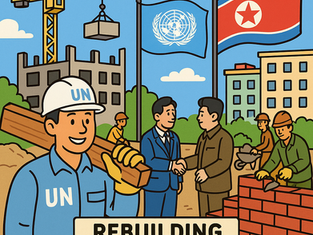
The First Citizens of a Unified Korea: Why Embracing North Korean Defectors Is Key to Reconciliation
Apr 14
4 min read
North Korean defectors are not just refugees—they are the first citizens of a future, unified Korea. This article explores how South Korea, from government to civil society, must embrace and integrate them to begin healing the deep divisions of the Korean Peninsula.

Key Insights
Welcoming North Korean defectors is essential to true reunification—not just politically, but socially and culturally. Their integration serves as a rehearsal for a unified Korea.
The South Korean government’s new initiatives, including the National Center for North Korean Human Rights and intergovernmental support for defectors abroad, reflect a strategic and moral commitment to healing the divide.
Churches and religious communities play a vital role in the integration process, offering not only material aid but also emotional, spiritual, and social support that fosters belonging and healing.
“North Korean defectors are reunification come early” is more than a slogan—it is a vision for building a cohesive Korea today by embracing those who have already made the journey.
As the Korean Peninsula remains divided by ideology, politics, and generations of pain, the path to reconciliation may not begin with summits or treaties—but with how South Koreans treat the people who have already crossed the line.
In a significant move, the South Korean government has announced the construction of a National Center for North Korean Human Rights in western Seoul. Scheduled for completion by next year, this project—backed by a 26 billion won budget—is part of a broader five-year roadmap to improve inter-Korean relations and address longstanding North Korean human rights issues.
But perhaps the most forward-looking element is the plan to create an intergovernmental body to support North Korean refugees abroad in entering and resettling in South Korea.
Human Rights: The Moral Groundwork for Reunification
By placing North Korean human rights at the center of policy, South Korea is doing more than challenging the legitimacy of the Kim regime. It is also defining the moral character of a future united Korea.
A nation that prioritizes human dignity, justice, and freedom is a nation ready to reunite not just territory—but hearts and minds. This is about more than diplomacy. It’s about the kind of society the Korean people want to build when the border no longer stands.
“Defectors Are Reunification Come Early”
As a popular phrase in South Korean public discourse goes:
“North Korean defectors are reunification come early.”
These individuals are not merely escaping hardship—they are walking ahead of the nation, crossing into a future Korea before the rest of the Korean people. By embracing and integrating them, South Koreans aren’t just offering refuge—they are practicing reunification itself, one person at a time.
Defectors bring with them stories, struggles, and strengths that can help bridge the enormous social and cultural gaps between North and South. But without care, support, and inclusion, they may face isolation, discrimination, and hardship—signs that South Korean society is not yet ready to reunite.
The Church: A Pillar of Support and Integration
In addition to government efforts, religious communities—particularly churches—have played a vital role in supporting North Korean defectors, both spiritually and materially. Many defectors rely on networks of Christian organizations in South Korea for help with escape, resettlement, and rebuilding their lives. These churches offer more than immediate aid—they provide a lasting sense of community, dignity, and belonging.
For instance, some churches offer financial support to defectors attending services, recognizing the economic hardships they face. Beyond material aid, churches often serve as centers for education, counseling, and vocational training, facilitating smoother integration into South Korean society.
Moreover, the spiritual guidance and communal support found in churches can be a source of healing for defectors who have endured trauma and isolation. By fostering environments of acceptance and understanding, churches play a crucial role in bridging the cultural and emotional divides between North and South Koreans.
The Healing Must Begin Now
Reunification will not arrive in a single moment—it will unfold through a long process. And that process must begin now, with how South Koreans choose to embrace the North Koreans already in their midst.
South Korea—through both government and civil society—must invest in trauma-informed care, language support, job opportunities, education, and, above all, community. Integration is not assimilation; it is about making room for those who have carried the weight of history alone for far too long.
A New Korea Begins with Compassion
The road to reunification will be long, unpredictable, and complex. But even now, South Korea can lead—not just through strength or policy, but through empathy and compassion.
By supporting defectors—the first citizens of a future, unified Korea—with love and dignity, and by recognizing the vital role of churches in this mission, South Koreans are not merely preparing for reunification—they are already living it.
Author: B.J. Choi, founder of NVNK, obtained his Master's degree in Asian Studies from the George Washington University. He previously worked for the National Endowment for Democracy (NED), the Woodrow Wilson International Center for Scholars (WWICS), and Cornerstone Ministries International (CMI) on North Korea issues.






